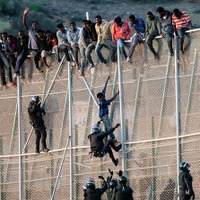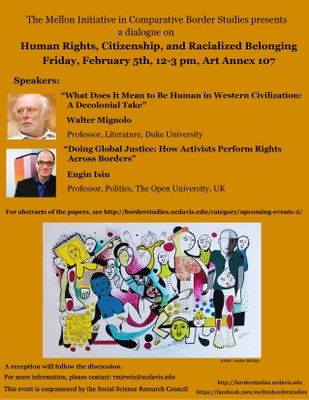On the eve of its winter 2016 keynote event, we look at the interdisciplinary work of the Mellon Initiative in Comparative Border Studies at UC Davis.
 As the only program of its kind in the UC system, the Comparative Border Studies initiative seeks to challenge the ways in which borders have shaped our thinking about them. Co-directors Sunaina Maira (professor of Asian American studies) and Robert Irwin (professor of Spanish and Portuguese and chair of Cultural Studies) want to explore border/ing events, contexts, and practices not only as objects of inquiry, but also as “epistemic angles.” Doing so means crossing disciplinary borders and thinking collaboratively.
As the only program of its kind in the UC system, the Comparative Border Studies initiative seeks to challenge the ways in which borders have shaped our thinking about them. Co-directors Sunaina Maira (professor of Asian American studies) and Robert Irwin (professor of Spanish and Portuguese and chair of Cultural Studies) want to explore border/ing events, contexts, and practices not only as objects of inquiry, but also as “epistemic angles.” Doing so means crossing disciplinary borders and thinking collaboratively.
Concerned that knowledge about borders is itself also bordered — by nation-state boundaries, conceptual partitions, and disciplinary differences — Maira and Irwin want to probe the ways in which collaborative thinking might itself be a border-crossing practice. Thinking according to bounded concepts and regions, they suggest, allows some places (such as Afghanistan and Pakistan), people (such as detained Mexican immigrants), and disciplinary foci (such as Palestine Studies) to disappear between borders.
Overcoming divisions
 Thinking across borders, Irwin says, “helps us to break out of our closed disciplines” and notice things about these sites and concepts that we might otherwise miss. “At this historical moment,” he explains, “borders are the site of big tensions. We were initially thinking about experiences in Palestine, Pakistan, Afghanistan, the US/Mexico border and our everyday life in California. And then the Mediterranean became a major site of border tension, too.”
Thinking across borders, Irwin says, “helps us to break out of our closed disciplines” and notice things about these sites and concepts that we might otherwise miss. “At this historical moment,” he explains, “borders are the site of big tensions. We were initially thinking about experiences in Palestine, Pakistan, Afghanistan, the US/Mexico border and our everyday life in California. And then the Mediterranean became a major site of border tension, too.”
The significance of numerous other border contexts, including the Dominican Republic and Venezuela, have become clear as the initiative has broadened its remit. With basic human rights at stake, divisions between academic fields and departments demand to be set aside.
“Thinking about borders is something that penetrates so many disciplines and so many geographical contexts,” Irwin says, “both past and present.”
Connecting disciplines
According to Maira, the initiative seeks to put these different border zones in contact, and to bring work from these different regions into dialogue with one another. Divisions between departments — ethnic studies and area studies, for example — are problematic and political, and must be overcome if new insight is to be gained.
“Borders are often arbitrary,” she says, “whether they are nation-state borders and boundaries or disciplinary ones. Areas of knowledge fall away, become invisible.” The goal, then, is to “create the space for these boundaries to be broken down, for faculty from different departments to interact together, and for the gaps to be filled. We hope that by connecting different disciplines and these sites — Afghanistan/Pakistan, Israel/Palestine, the US/Mexican border — we can start to undo this sequestration.”
Mignolo and Isin
On Friday, Feb. 5, from noon to 3 p.m., the initiative will host its keynote event of the winter 2016 quarter — a dialogue on Human Rights, Citizenship, and Racialized Belonging. The event will feature Walter Mignolo, an Argentine semiotician and professor of literature, and Engin Isin, a Turkish political theorist.
Together these scholars will unpack concepts often considered self-evident to social theorists. Drawing on different disciplinary backgrounds and empirical contexts, their dialogue will explore what it means to be a “human” bearer of rights and, similarly, what it means to desire and engage in struggles for “justice” across shifting borders. Real-time updates from the event will be shared on Twitter at @MellonCBS.
This dialogue will continue the conversation initiated in the Comparative Border Studies launch event last fall, which featured a diverse group of scholars, activists, and students reflecting on questions of borders, citizenship and race, solidarity, and resistance.
“We wanted to bring two thinkers who have been working in different contexts — on the question of human rights, citizenship, and race from a decolonial vantage point — into conversation with each other,” explains Maira.
Events and opportunities
In addition to this Friday’s keynote event, the initiative will host a symposium on April 15, 2016, featuring interdisciplinary scholars working from regions including the Caribbean, Canada, Palestine, Afghanistan and Pakistan, and U.S./Mexico. Together, they will explore terms such as “citizenship,” “belonging,” and “human rights.” They will also address how thinking about these pressing sites and issues requires us to blur the borders between conceptual and disciplinary frameworks.
In spring 2016, Middle East/South Asia Studies will host an undergraduate course entitled Mediterranean Migration Crisis: Human Mobility, Rights and Loss at Sea. Taught by Visiting Professor of Comparative Border Studies Maurice Stierl, the course will help students think about the various “reasons for flight and displacement, the irregularization of (certain) migrations, human rights violations at sea and the ways in which people move despite borders and thereby enact their ‘right to escape.’” Omar Abdullah will also be curating an undergraduate film festival on borders in the spring.
The program is currently inviting affiliation to interested graduate students and faculty. If you are interested in participating and engaging in regular reading groups, please contact Sunaina Maira or Robert Irwin.
— Tory Brykalski
Learn more
Visit the Comparative Border Studies website.
